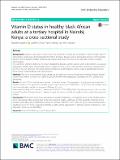| dc.contributor.author | Elizabeth Kagotho, Geoffrey Omuse, Nancy Okinda, Peter Ojwang | |
| dc.date.accessioned | 2022-01-21T10:16:27Z | |
| dc.date.available | 2022-01-21T10:16:27Z | |
| dc.date.issued | 2018 | |
| dc.identifier.uri | https://repository.maseno.ac.ke/handle/123456789/4450 | |
| dc.description.abstract | Vitamin D has been known since the twentieth Century for its benefits in bone health. Recent
observational studies have demonstrated its benefits in infectious diseases such as tuberculosis and non-communicable
diseases such as diabetes mellitus, cardiovascular diseases and cancer. This has led to a dramatic increase in testing
among adults.
The cut-offs for vitamin D deficiency have been debated for decades and the current cut off is derived from a Caucasian
population. Studies done among black African adults in Africa are few with vitamin D deficiency ranging from 5
to 91%. A few cut- offs have correlated vitamin D deficiency to physiological markers such as parathyroid hormone
(PTH), calcium and phosphate with varying results. | en_US |
| dc.publisher | BioMed Central | en_US |
| dc.subject | Vitamin D deficiency, Cut-offs, Kenya, Africa | en_US |
| dc.title | Vitamin D status in healthy black African adults at a tertiary hospital in Nairobi, Kenya: a cross sectional study | en_US |
| dc.type | Article | en_US |

